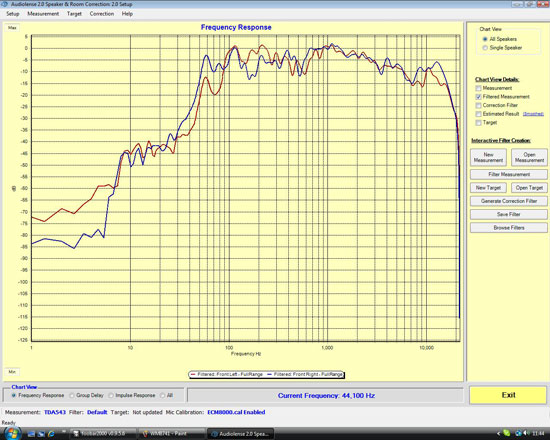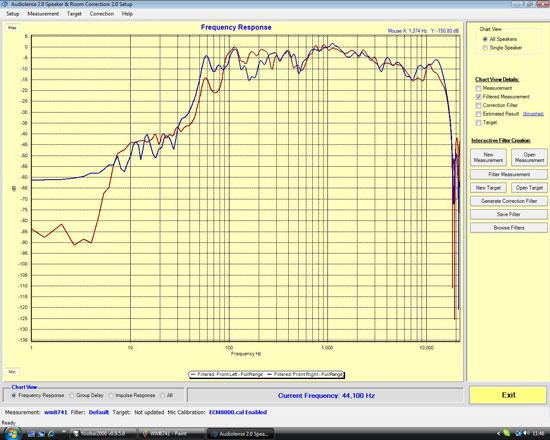Subjective Listening - Arrrgh!
For audio playback, we use Foobar 2000 alongside Windows Media Player. All music is transferred first to the hard drive in WAV format using Exact Audio Copy at a 4x read speed. Before we continue with subjective listening impressions, let's take a look at the measured room response of both DACs and listen to a couple of tracks without any DRC engaged.
The lowish output voltage of the passive I/V configured TDA1543 means we have to attempt to balance volume as best we can with the 2V output of the tube/transformer output of the Opus DAC for comparison purposes. After some adjustment and re-attempted measurements, we get a close enough match to see how the room responds to the Opus. Microphone gain and placement was kept at exactly the same point throughout the course of taking measurements. Each measurement was taken a number of times to see if any drastic changes could be observed.
Doede DAC Red=Left speaker, Blue=Right. Due to furniture placement, there is a 10dB offset between the channels at around 162Hz. |
The response is of the Transparence speakers with the TDA1543 is pretty much as expected, rolling off sharply under 60Hz and over 13.5k.
Opus |
Unsurprisingly, there's little to divide the two room sweep responses. The question is how both DACs sound when compared subjectively, both with and without DRC.
Listening tests are conducted using tracks from Maxwell's Urban Hang Suite and Embrya albums. Both albums feature music containing deep articulate bass lines, with vocals and instruments that should stress every part of the Bicone Signature frequency response.
Firing up "Til The Cops Come Knocking" on the Doede DAC first, the thing that strikes me is its directness. Soundstage height and depth can be best described as compact with a focused central image. This creates the perception of the vocalist sitting a couple of feet in front of the speakers. Instruments also have a "hang in the air" factor, without any real overemphasis on the finer details or decay of sounds. If "in your face" reproduction of micro details is important to you, you'll find you'll have to concentrate on hearing them with this unit in the loop. Everything's there, but you don't get buckets of spatial information that enhances micro-detail presence. Maybe that's the way it's supposed to be?
Rendition of high frequency sounds such as cymbals is on the smooth side compared to what I can recall from the Legato DACs of the Pioneer. I guess this may be a trait of non-oversampling. Overall, I'm quite impressed by the sound, considering the uncomplicated approach of Doede's implementation of the TDA1543. Subjectively, the sound has a very neutral character yet still manages to present itself without a fatiguing nature.
Now it's time to check out how the Opus fares in comparison. Both DACs are connected to the preamp simultaneously so that I can switch over quickly between the two while memory is still fresh. I spin up the same tracks from Maxwell and I'm amazed to find the perceived difference in presentation is far more apparent than I'd expected. The vocal forwardness of the TDA1543 is gone; the same vocal rendition sits further back between the speakers but has gained the impression of extending past the height of the baffles, and background instruments seem to have shifted back by a good few feet. The compact soundstage impression that the TDA1543 gave has been replaced with something far more expansive and spatial and the focus is now on all the elements of the recording. The finer details are readily apparent with the Opus; everything is projected in its own space and draws your attention. Mid-bass does not sound as prominent as it did on the TDA1543, the notes seem to be a little leaner and perhaps more analytical. Vocals and cymbals are especially alluring, something that we can put down to the sonic traits of the 3A5s on the output of the WM8741 DACs. To confirm the perceived differences I keep switching back and forth between the two units, each time amazed that the change is so apparent.










114 Comments
View All Comments
kleshodnic - Monday, December 1, 2008 - link
Uh, just go digital out (TOS/link or HDMI) to a receiver and let ther receiver do the DAC'ing.Want a better DAC? Buy a better receiver. Not only will you get the better DAC, you will get a ton of other great features with a higher end receiver.
All this talk about computer audio is assuming that you would want to come analog out from the computer. WHY?
phusg - Tuesday, December 2, 2008 - link
It would be a lot easier I agree, but AFAIK only really expensive top-end receivers can challenge the analog out you can get from a quality consumer audio card with upgraded opamps, especially when it comes to stereo music. They are also not usually moddable. Can you link to a review of receiver with audiophile quality stereo DAC?pedobosz - Monday, December 1, 2008 - link
an interesting place to publish such an article. Have you thought of perhaps submitting to Stereophile or The Absolute Sound ? I'm sure you are just trying to raise the awareness of the PC crowd to the possibilities of great audio, but reading through the other replys, I think you are preaching to the deaf......with the exception of the Martin Logan fellow.jnmfox - Monday, December 1, 2008 - link
Computers and audio (mostly Home Theater) are my main two hobbies. I agree this article doesn't fit here at anandtech.com. I've never understood the esoteric audio crowd. If you want quality audio information go to audioholics.com or other reputable audio sites.jabber - Monday, December 1, 2008 - link
I have to say the article and lengths gone to are way over the top for what in most cases is required.The kits combined with the PC audio side is way esoteric too.
Well intentioned but sledgehammer to crack nut.......
haukionkannel - Monday, December 1, 2008 - link
Hmmm... When we talk about HiFi nothing is "bit over".For a hifi system this was relative middle range solution. The biggest consern, if you have to find one, is that the speakers will most propably have the biggest effect an the hearing experience. These type of speakers ar not meat to be the most precise in their "room" picture. And I don't say that it's a bad thing! They are good speakers. Some studio monitors would maybe be better for testing the PC as an "Hifi" sound source, because they try not to affect the sound at same way as some High end HiFi speakers, but again it's more of a matter of taste. For example Genelec speakers sound good for Vocal based music. These in here are better in music where accuracy is not so important. So it allso depends on what music you like to listen to. Just like someone above said.
I would like to see how the sound compares between good Hifi cd-player and a PC. With the same music piece and speakers. This set with those tubes can make the sound varmer, that is good for some not so good mp3 files. More accurate monitor speakers and normal amplifier, will most propably reveal the difference between good cd and not so good PC based mp3 more clearly.
Most people who are really interested in HiFi systems spent even more money than in test to their system. The real guestion is that is the PC good enough soundsource for system like that.
jabber - Monday, December 1, 2008 - link
Yes but real high end hifi is really usually bought by what Top Gear would call 'cocks'. Folks that just see money and how much they spent rather then just enjoying music. $50000 hifi systems geared to playing just 10 specialist audiophile CDs just screams "I've led a sad and lonely life!" to me.Show me a $1000 system surrounded by piles of CDs and LPs, now thats an exciting system!
The readership of this site I would say on the whole would have far more modest hifi setups.
Once you spend so much on a hi-fi you fall into the trap of listening to the equipment rather then the music itself.
Spivonious - Monday, December 1, 2008 - link
Spending that much time and effort to listen to pop music is just about the silliest thing I've ever heard.At least put something on that will work the equipment, like a Beethoven string quartet, or a Bach choral work.
And you never even touched on the issue of vinyl vs digital. To my ears, vinyl sounds so much more organic than the plasticy sound of CDs, even through a $15,000 tube-driven stereo system.
Rajinder Gill - Monday, December 1, 2008 - link
Actually, I'm just listening to some Vaughan Williams right now. Just because there's no mention in the article does not mean to say I live without classical pieces.Peace...
Hyperion1400 - Monday, December 1, 2008 - link
Amen to that. There is no set style of music for audiophiles. I personally enjoy metal and classic punk (bad religion,sex pistols etc.) as well as a mix of classical composers(I have always had a strange love for Beethoven's 9th after watching Neon Genesis Evangelion)Also, will you be doing a review of the X-fi Elite Pro or will you be primarily dealing with external hardware. I know I will most likely be shunned for mentioning such a thing in the same post as (vicariously) declaring myself an audiophile, but I absolutely love mine. Without that card and my Senhiesser HD 650s, I don't think I could listen to my music/games the same way again(no pun intended)